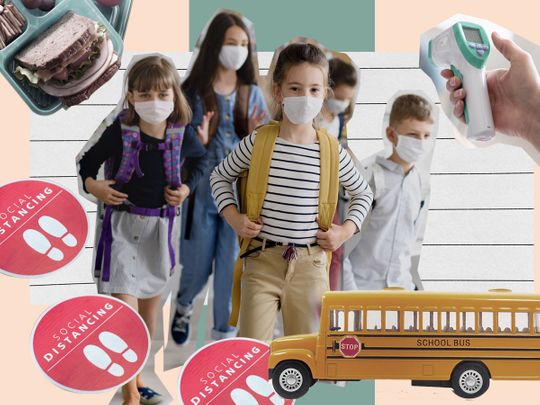
The first few weeks back at school can be stressful for kids at any time, but during the pandemic they come with a whole host of additional potential pain points.
The face masks; the social distancing; the restrictions on parents being allowed on school grounds. All of these changes and more - which are crucial for keeping everyone safe – have meant that many of the parents who opted to send their children back to school in-person this term, did so with some trepidation.
So it’s come as something of a shock for both parents and teachers to realise that there have actually been some unexpected positive consequences of the new COVID regulations.
“Last year, some younger children used to cry when their parents dropped them off at the classroom,” tweeted the KHDA following its tour of The German International School Dubai. “Now, their parents aren’t allowed to drop them off in class, and none of them are crying!”
From less separation anxiety to a renewed appreciation for the value of school, Dubai parents and teachers have been surprised to find several silver linings to the New Normal of the academic term: “It was such a nerve-wracking decision to put them back into school when cases were rising,” says Sophia Janahi, an Emirati mum who has a son in year 4 and a daughter in FS2 at a British curriculum school. “However even just after the first day the change in my children’s mood and behaviour was noticeable - they have settled in so well compared to last year.”
Have the new COVID rules helped with children’s separation anxiety?
It’s expected that for the first few weeks of a new school term younger children may have a few teary moments as they get used to their new environment, but teachers agree that the COVID restrictions have actually resulted in less separation-anxiety tears from children this term, rather than more.
“In the first weeks of school, we can sometimes struggle with transition times for our Early Childhood students,” says GEMS World Academy Dubai Primary Principal, Kristen Murphy. “This year, we assumed it was going to be even more difficult separating our young students from their parents. However, we have been so pleasantly surprised with how the students have reacted to drop-off this year.”
Murphy says she thinks some of it may be to do with the children’s excitement at being back at school after such a long time away. “Students have been home since March; they haven’t seen their friends or been in uniform. Our teachers are also so excited to be back in school, and this has been felt by all.”
Hannah Howard, Head of Early Years Foundation Stage at Horizon English School, agrees that the excitement of being reunited at school again has helped children settle in: “As expected, some children have found this more challenging than others, but as a whole, I agree the children have demonstrated happiness and pure excitement to return back to school just as much as the staff.”
Meanwhile the team at GEMS Wellington Primary School (WPS) say they have definitely noticed a quicker settling-in period amongst kids this year compared to others: “Our students have taken less time to settle into their morning routines compared with previous years,” say Michelle Hughes, Primary Counsellor; Georgina Bradley, Assistant Principal; and Rebecca Howells, Head of Foundation Stage. “On the whole, children have been keen and eager to come into class and interact with their class teacher and peers, while adhering to social distancing.”
Surprise silver linings
While there’s no doubt that going back to school in a pandemic has come with many challenges, there have been some interesting flipsides. For instance, the requirement for all members of the community to socially distance has led to most schools adopting staggered start times, instead of one strict drop-off time, meaning that the crowds of parents and students entering classrooms all at once are avoided. This has been a great relief for some parents:
“I personally love the more flexible, staggered start times,” says Holly Caitlin, an expat mum-of-three whose two older children (5 and 3 years) attend a British curriculum school in Dubai. “We always struggled with the early starts, so the added flexibility has made the mornings so much less stressful,” she says. “I am sure that this calmer morning filters down to how the children feel about being dropped off at school.”
The KHDA guidelines for returning to school also require that children in Year 1 (KG2) and below are kept in ‘stable’ groups of no more than 10 students. This has enabled more personalised attention for younger kids - who are most prone to separation anxiety - which the WPS team believe has helped children settle in more swiftly.
“The students have been given an individual welcome in the morning, as we have put in place staggered starts at the beginning of the day," says Assistant Principal Georgina Bradley and the team at WPS. "With our class ‘bubbles’ made up of a maximum of 10 children, our students have been able to build relationships with class teachers, teaching assistants and peers more quickly.”
The current regulations mandate that only one guardian is allowed to enter the school for drop-off or pick-up, and each parent has a maximum of 10 minutes in which do to it. While in normal times parents might linger to say a long goodbye or to watch their little ones settle into their classroom, this is no longer possible. And it’s actually better for the kids, say the WPS team: “The children are not overwhelmed by a large number of adults in the corridor; as they enter, they have a clear view from the door to their classroom.”
Additionally, a parent’s own emotional state often informs that of their child’s, so if a parent is showing reluctance to leave, this can provoke anxiety in their child. The faster and more streamlined drop-offs that are now required mean that this sort of delay is no longer possible: “Although the drop off has changed, the parents are still a part of this process and this has not been removed. There is just less time to delay the separation,” says Joanna Bacon, Head of Early Years at Repton School.
Increased independence
While social distancing means that teachers are no longer able to physically assist younger children with many tasks, the flipside of this has been that children’s independence has thrived, says Horizon English School’s Hannah Howard. “Children’s independence has consequently improved, creating more ‘independent learners’, which is demonstrated in their learning skills within the classroom. In the Early Years Foundation stage, we have been able to work with children in smaller groups, supporting their learning and creating a bespoke approach to suit all our inquisitive and creative learners.”
GEMS Wellington Primary School (WPS) has noticed the same: “The children have become more independent in their learning and life skills. Children are able to use technology more independently to access their learning and communicate with their teacher and classmates. They have had to develop skills in time management, follow a given timetable and be responsible for their own learning. We have observed that many children have further developed their level of resilience and adaptability to new situations.”
The online dimension
Having the technology of distance learning at schools’ and parents’ fingertips – and the fact that everyone had to take a crash course in this technology in real time when the pandemic hit – has enabled a new avenue for familiarizing children with the school environment ahead of time. “Providing virtual tours and videos for the parents beforehand has helped to extinguish any worries that the parents may have,” says Repton school’s Joanna Bacon. “If the parent is relaxed, then this is communicated subconsciously to the child.”
Mum-of-two Zeyna Sanjania, says that her son’s school started with online learning before moving into physical learning, which she believes made the settling in process much easier: “My son has settled much more smoothly into year one compared to before,” says Zeyna, “I am not sure if it’s because he’s older, or in a smaller class. But an unexpected upside was that he was able to get to know and bond with his teacher on screen during the first week of distance learning, so that when he did join school, he was already well acquainted with the teacher, which I suppose makes the transition smoother.”
Lessons in perspective
With all of the COVID-related changes happening, schools have needed to put a greater focus than ever on children’s wellbeing, which has resulted in even more nurturing environments. “A lot of emphasis has been placed by the KHDA and DHA on looking after students and families’ well-being, which has been so important,” Says GEMS World Academy Dubai Primary Principal, Kristen Murphy. “Reminding ourselves and our students to take care of themselves and others has been an important lesson. It has been a wonderful opportunity for us to see how resilient, open-minded and brave our students are.”
Having experienced the isolation of lockdown, and the disruption of home learning, most of the parents and students who have chosen in-person schooling this term are more grateful than ever for the job the teachers do and the service that schools provide, which is so much more than just academia.
“Before the lockdown it was a struggle every morning to get my kids to go to school, but now they run through the school gates,” says Emirati mother Sophia Janahi. “My son in year 4 even said to me, ‘I can’t believe how much I actually like school now, it’s so much easier to learn with real people.’ The change in their attitude to school after it being ‘taken away’ is incredible.”
And the teachers are just as grateful to have the children back to teach in-person too, as Repton School Dubai’s Joanna Bacon says, “Children are truly amazing and should never be second guessed or underestimated. Their resilience is astounding.”










